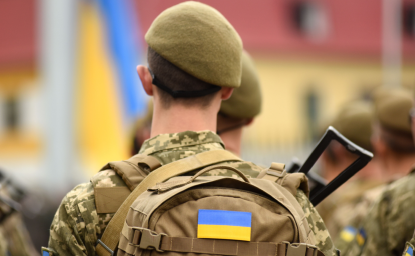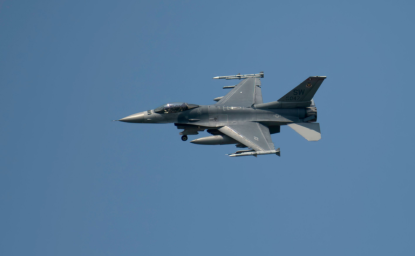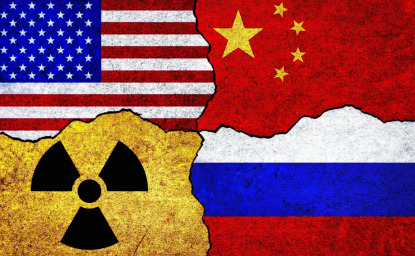America’s retreat from world affairs following World War I, including not preparing as the second World War approached and erupted, starkly demonstrated that inaction compounds threats. Ukraine is yet another lesson where there is no holiday from history and no escape from world politics for America, no matter how much it wishes otherwise. With most Americans not supporting continued aid to Ukraine, the politically expedient path is to oppose further aid. Yet the reasons for opposing continued support for Ukraine lack substance and the consequences for not doing so are severe.
Ten Reasons for Ending Support that Lack Substance
It’s not America’s fight. Words that echo Neville Chamberlain’s statement as the West abandoned Czechoslovakia in the prelude to World War II, suggesting it was a “quarrel in a faraway country, between people of whom we know nothing.” The war in Ukraine should have again clarified for all that there is no such thing as a self-regulating international order. Those who engage define the ordering of world affairs. Finland and Sweden recognized this empirical fact of history by abandoning a half century of neutrality to join NATO. Either the US continues to lead, or the authoritarian powers will fill the void and tilt the global landscape in their favor.
All combatants should reach a peace agreement. With current facts on the ground, in the doubtful case an agreement could be reached, it would represent a Russian victory, an incentive for tyrants around the world to create facts on the ground that play in their favor. Russia would retain key strategic terrain and critically, much of Ukraine’s industry and agriculture. Food and energy prices would remain high, potentially starving many nations and exacerbating the migrant crisis in the West. Meanwhile, Russia could bide its time, rebuild its strength and seek to seize the rest of Ukraine if the opportunity arises.
No blank check. There must be oversight. The US must, of course, keep a keen eye and ensure Ukraine roots out corruption. President Zelensky’s administration has shown resolve in holding senior leaders accountable. Ukraine’s leadership must know that aggressively attacking corruption is necessary for the country’s fight for an independent democratic future as part of the European Union. This will require ensuring that oligarchs do not have undue influence over the Ukrainian government. As long as Zelensky maintains this course, Ukraine deserves American support.
NATO enlargement up to Russia’s borders and failing to decisively rule out Ukrainian membership make NATO partially responsible for Russia’s invasion. If NATO has any culpability, it bears the responsibility, not Ukraine. It is responsible to protect Ukraine from the consequences of any missteps NATO made.
The US needs to invest in securing its own borders instead. Supporting Ukraine does not limit action at the US border. It is not a zero-sum game. With Ukraine support being only 5% of the Defense Department’s budget, America can afford this vital effort in its national (and the world’s) interest.
America cannot afford to support Ukraine because it would borrow the money to do so. The sea of massive deficits as far as the eye can see must be addressed, but deficits are not the result of defense spending or foreign aid. The overwhelming driver of future deficits are entitlement programs on a path to insolvency, with Medicare’s trust funds forecasted to be depleted by 2031 and Social Security expected to run short of cash by 2033. Putting entitlements on a long-term path to solvency would significantly reduce the deficit. Discretionary spending is only 29% of total spending and non-defense discretionary spending is below the prior 30-year average relative to the size of the economy. Defense spending has dropped significantly as a percentage of GDP and is now at post WWII lows, even as threats are at post WWII highs. The US can ill afford to continue ignoring both the need to ensure the solvency of entitlements and to match its defense spending (including support for Ukraine) to the scale of the threats it faces.
Europe needs to do more. It takes a bit of nerve to complain Europe is not doing enough, even as European nations largely increase their defense spending (though they need to go further) while the current funding accords have America cutting historically low defense spending in real terms. But let’s be clear– Europe is doing more. As Senate Minority Leader Mitch McConnell has said, “When it comes to security assistance to Ukraine as a share of GDP, 14 of our European allies are actually giving more.” Europe is not giving up on Ukraine. Neither should the US. Both need to do more.
Ukraine is just another Vietnam, Iraq, Afghanistan. Passing over for the moment judgement on these conflicts, there are three big differences. First, no American service men and women are deployed on the front lines in Ukraine. Second, Ukrainians are leading the fight. Third, the opponent is not a faction within the country, but a major nemesis of the US–Putin’s Russia.
America needs to focus on Taiwan instead. Success in Ukraine would contribute to deterring conflict in Taiwan. Failing to achieve a durable peace in Ukraine would increase the level of effort required for the US military in Europe, distracting it from a focus on deterring aggression in East Asia. A Ukrainian victory would result in a battle-hardened partner able to help keep the peace. The People’s Republic of China (PRC) is more of a peer economically, militarily, and diplomatically than Nazi Germany or the Soviet Union. America needs its allies support to deter conflict in Taiwan. Abandoning the Ukraine struggle that is central to Europe’s security would not only embolden the PRC but also let down America’s allies whose support it needs in the Pacific.
President Zelensky’s goal of recovering all of Ukraine’s territory unrealistic. It is too early to make that assessment. The directional progress of the conflict, though slow, shows continued advances for Ukraine and retrenchment by Russia. The Abrams tanks just arrived, and it will still be months before America has trained Ukrainian pilots to fly F-16s. Perhaps the US has been too hesitant and slow in arming Ukrainians. But if so, America should not compound that error by pulling the plug too early.
Conclusion: Why America must Support Ukraine
America has not witnessed a case of freedom under threat in such black and white terms in recent decades. Ukraine, a courageous democracy, did nothing to provoke this conflict. It was brutally attacked in a war of choice inflicted upon it by President Putin. If the US stands aside as Ukraine’s territorial integrity and sovereignty are under threat, what does America stand for?
In addition to a moral obligation, America has given Ukraine security assurances. As the Soviet Union disintegrated, the US convinced Ukraine to surrender its Soviet nuclear weapons in exchange for security assurances in the 1994 Budapest Memorandum. However damaging the abandonment of Afghanistan was to America’s credibility, the US had no comparable obligation to Afghanistan. If America reneges on its commitment to Ukraine, who would ever believe America again?
Times appear challenging today in Ukraine and America. Americans seem to have forgotten that America has faced similar challenges before and prevailed. Perhaps observing the courage of the Ukrainians can refresh our memory and rekindle American spirits. Americans must see past the baseless excuses for not continuing to support a democracy under brutal assault. Ukraine’s liberty is on the line. So is America’s credibility.
Author


Wahba Institute for Strategic Competition
The Wahba Institute for Strategic Competition works to shape conversations and inspire meaningful action to strengthen technology, trade, infrastructure, and energy as part of American economic and global leadership that benefits the nation and the world. Read more


Global Europe Program
The Global Europe Program is focused on Europe’s capabilities, and how it engages on critical global issues. We investigate European approaches to critical global issues. We examine Europe’s relations with Russia and Eurasia, China and the Indo-Pacific, the Middle East and Africa. Our initiatives include “Ukraine in Europe”—an examination of what it will take to make Ukraine’s European future a reality. But we also examine the role of NATO, the European Union and the OSCE, Europe’s energy security, transatlantic trade disputes, and challenges to democracy. The Global Europe Program’s staff, scholars-in-residence, and Global Fellows participate in seminars, policy study groups, and international conferences to provide analytical recommendations to policy makers and the media. Read more





